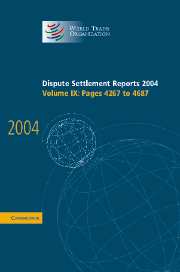Book contents
- Frontmatter
- Contents
- United States – Anti-Dumping Act of 1916 (Original Complaint by the European Communities) - Recourse to Arbitration by the United States under Article 22.6 of the DSU (WT/DS136) Decision by the Arbitrators
- European Communities – Conditions for the Granting of Tariff Preferences to Developing Countries - Arbitration under Article 21.3(c) of the DSU (WT/DS246) Award of the Arbitrator
- United States – Continued Dumping and Subsidy Offset Act of 2000 (Original Complaint by Brazil) - Recourse to Arbitration by the United States under Article 22.6 of the DSU (WT/DS217) Decision by the Arbitrator
- United States – Continued Dumping and Subsidy Offset Act of 2000 (Original Complaint by Canada) - Recourse to Arbitration by the United States under Article 22.6 of the DSU (WT/DS234) Decision by the Arbitrator
- United States – Continued Dumping and Subsidy Offset Act of 2000 (Original Complaint by Chile) - Recourse to Arbitration by the United States under Article 22.6 of the DSU (WT/DS217) Decision by the Arbitrator
- United States – Continued Dumping and Subsidy Offset Act of 2000 (Original Complaint by the European Communities) - Recourse to Arbitration by the United States under Article 22.6 of the DSU (WT/DS217) Decision by the Arbitrator
- Cumulative Index of Published Disputes
European Communities – Conditions for the Granting of Tariff Preferences to Developing Countries - Arbitration under Article 21.3(c) of the DSU (WT/DS246) Award of the Arbitrator
Published online by Cambridge University Press: 13 December 2017
- Frontmatter
- Contents
- United States – Anti-Dumping Act of 1916 (Original Complaint by the European Communities) - Recourse to Arbitration by the United States under Article 22.6 of the DSU (WT/DS136) Decision by the Arbitrators
- European Communities – Conditions for the Granting of Tariff Preferences to Developing Countries - Arbitration under Article 21.3(c) of the DSU (WT/DS246) Award of the Arbitrator
- United States – Continued Dumping and Subsidy Offset Act of 2000 (Original Complaint by Brazil) - Recourse to Arbitration by the United States under Article 22.6 of the DSU (WT/DS217) Decision by the Arbitrator
- United States – Continued Dumping and Subsidy Offset Act of 2000 (Original Complaint by Canada) - Recourse to Arbitration by the United States under Article 22.6 of the DSU (WT/DS234) Decision by the Arbitrator
- United States – Continued Dumping and Subsidy Offset Act of 2000 (Original Complaint by Chile) - Recourse to Arbitration by the United States under Article 22.6 of the DSU (WT/DS217) Decision by the Arbitrator
- United States – Continued Dumping and Subsidy Offset Act of 2000 (Original Complaint by the European Communities) - Recourse to Arbitration by the United States under Article 22.6 of the DSU (WT/DS217) Decision by the Arbitrator
- Cumulative Index of Published Disputes
Summary
INTRODUCTION
On 20 April 2004, the Dispute Settlement Body (the “DSB”) adopted the Appellate Body Report and the Panel Report, as modified by the Appellate Body Report, in European Communities – Conditions for the Granting of Tariff Preferences to Developing Countries (“EC – Tariff Preferences”). At the DSB meeting of 19 May 2004, the European Communities confirmed its intention to implement the recommendations and rulings of the DSB in this dispute and stated that it would require a “reasonable period of time” in which to do so, pursuant to Article 21.3 of the Understanding on Rules and Procedures Governing the Settlement of Disputes (the “DSU”).
On 16 July 2004, India informed the DSB that consultations with the European Communities had not resulted in agreement on the reasonable period of time for implementation. India therefore requested that such period be determined by binding arbitration, in accordance with Article 21.3(c) of the DSU.
The European Communities and India were unable to agree on an arbitrator within 10 days of the matter being referred to arbitration. Therefore, on 26 July 2004, India requested that the Director-General appoint an arbitrator pursuant to footnote 12 to Article 21.3(c) of the DSU. The Director-General appointed me as arbitrator on 4 August 2004, after consulting the parties. I informed the parties of my acceptance of the appointment by letter dated 6 August 2004.
The European Communities and India have agreed that this award will be deemed to be an arbitration award under Article 21.3(c) of the DSU, notwithstanding the expiry of the 90-day period stipulated in Article 21.3(c). The parties have also agreed, pursuant to Article 21.4 of the DSU, that “exceptional circumstances” in this dispute justify the determination of the reasonable period of time more than 18 months after the establishment of the Panel.
The European Communities and India provided their written submissions to me on 18 August 2004. I requested additional information from the European Communities by letter dated 24 August 2004, and the European Communities provided a written response on 1 September 2004. An oral hearing was held on 2 September 2004.
- Type
- Chapter
- Information
- Dispute Settlement Reports 2004 , pp. 4313 - 4340Publisher: Cambridge University PressPrint publication year: 2006

